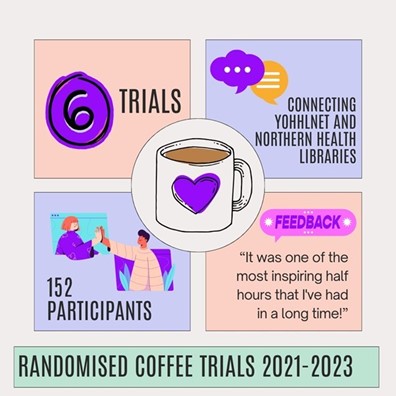This blog post details our experience organising a series of Randomised Coffee Trials within the Yorkshire (YOHHLNet) and Northern Health Libraries Networks highlighting the program's success in building bridges, facilitating knowledge exchange, and ultimately strengthening our network.
What is an RCT?
A Randomised Coffee Trial is a social experiment where colleagues from different departments are randomly paired for coffee meetings. It's a fantastic way to break down silos, foster new connections, and encourage knowledge sharing in a casual, low-pressure setting.
More information about RCTs can be found via the NHS England Knowledge Mobilisation toolkit page.
Why did we do this?
The shift to remote work due to the pandemic undoubtedly posed challenges in fostering connections and a sense of community within our geographically dispersed librarian network. This was particularly true for colleagues across different Trusts, who may not have had the chance to meet or collaborate in the past. Recognising this gap, we saw the Randomized Coffee Trial as an opportunity to bridge the physical distance and geographical divides. By randomly pairing colleagues for virtual coffee meetings, we hoped to spark casual introductions, encourage knowledge exchange across departments, and ultimately foster a stronger and more collaborative network within the Y&H region and Northern regions.
Where did we do this?
Initially, we piloted the Randomized Coffee Trial on a smaller scale for library assistants within YOHHLNet. The positive feedback and clear benefits of fostering connections across library teams spurred us to expand our horizons. We recognized that the limitations of geographical location shouldn't stop us and the power of connecting with colleagues across the broader North region was too significant to ignore. Therefore, we decided to spread the love and extend the program, allowing library colleagues from Trusts within the North to connect and share their unique perspectives. This expansion not only enriched the experience for participants but also strengthened the collaborative spirit and sense of community within the entire northern NHS library network. While we were aware of similar initiatives, such as those organized by the CILIP Health Libraries Group, our goal was to create a more focused experience tailored to our specific needs.
How many people have taken part so far?
In Spring 2021, we ran an RCT for library assistants across YOHHLNet, and shortly after trialled RCTs for librarians (not in managerial roles) and also library managers across the North. We had 7 library assistants sign up for the YOHHLNet RCT, whilst the other RCTs had 26 and 19 colleagues sign up respectively. After the success of these, both in terms of numbers of sign ups and also the feedback, we have since run three more RCTs. The numbers of colleagues signing up has remained fairly consistent – 34 in Autumn 2021, 32 in Autumn 2022 and 34 in Spring / Summer 2023.

How did we organise these?
When it came to pairing colleagues, we strived to create a unique and meaningful experience. We offered participants the optional opportunity to connect with someone holding a similar role in another location, catering to those seeking to learn from peers facing similar challenges and opportunities. However, we also prioritised matching individuals from different regions, fostering connections across geographical boundaries. To ensure new experience for all participants, we considered previous pairings, ensuring colleagues wouldn't be matched with the same individual multiple times.
What did people think?
Feedback showed that the RCT had been very beneficial for participants.
“This trial helped me to socialize outside the Trust.”
“While there are still so few face to face events happening, the RCT does fill a gap where a conversation in a coffee queue would have been.”
“I got to meet someone I would have otherwise probably never have met - and we're going to keep in touch to keep swapping ideas”
“Having time to chat with a colleague and explore our similarities. It's so good to meet new people and expand our personal and professional networks”
“It was one of the most inspiring half hours that I've had in a long time!”
Conclusion
The feedback speaks about the success of the Randomized Coffee Trials we organised. It demonstrably helped colleagues break free from departmental silos and forge connections outside their immediate work environment. Participants highlighted how the RCT filled the void left by a lack of in-person events, fostering casual, yet meaningful conversations that wouldn't have happened otherwise. Moreover, the program facilitated the creation of new and lasting connections, with individuals expressing their desire to stay in touch and exchange ideas.
The experience even proved to be inspiring for some, showcasing the power of these seemingly simple interactions. The success of the RCTs within the North demonstrates the program's potential to empower NHS librarians by fostering connections, collaboration, and ultimately, a stronger and more vibrant network. We are already planning the next round of RCTs, looking forward to brewing even more connections within the inspiring world of NHS librarianship.
Federica Bianchini, Library Services & Information Resources Manager, Bradford District Care NHS Foundation Trust
Fran Morrisroe, Assistant Librarian at Barnsley Hospital NHS Foundation Trust
Helen Swales, Library Services Manager, Leeds Community Healthcare NHS Trust

